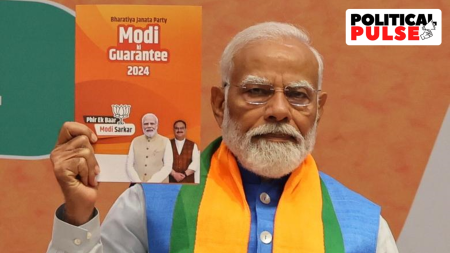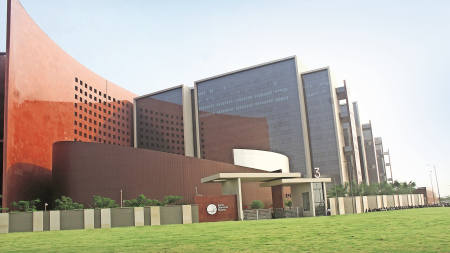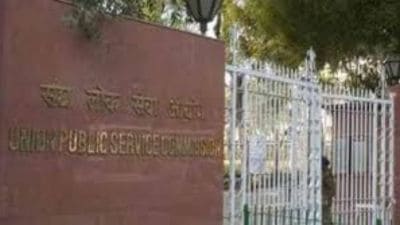- India
- International
In western UP, farmers are angry, tractors get ready for R-day protest
Bottled-up anger against unpaid cane dues, stagnant prices and increase in input costs is now finding expression in the fight against "kaale kanoon".
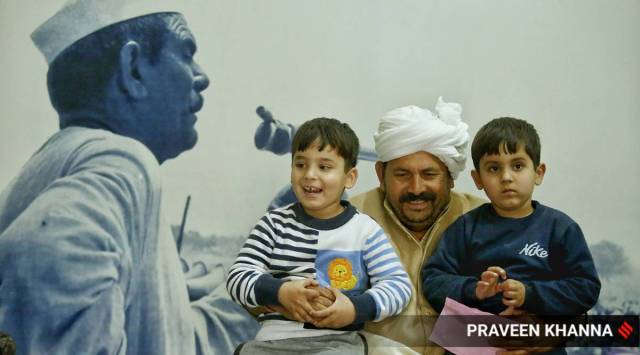 BKU President Naresh Tikait with his grandsons and a photo of his father Mahendra Singh Tikait seen in the picture, at his village in Muzaffarnagar, Uttar Pradesh. EXPRESS PHOTO BY PRAVEEN KHANNA
BKU President Naresh Tikait with his grandsons and a photo of his father Mahendra Singh Tikait seen in the picture, at his village in Muzaffarnagar, Uttar Pradesh. EXPRESS PHOTO BY PRAVEEN KHANNA At Sisauli, the village of Mahendra Singh Tikait, on whose call half-a-million farmers from western Uttar Pradesh occupied New Delhi’s Boat Club lawns for a week in October 1988, anger against the Centre’s three agricultural reform laws is palpable.
“There are 11,000 voters here. Out of 8,000-odd votes cast in the 2019 Lok Sabha polls, nearly 5,500 went to Bharatiya Janata Party (BJP). Lekin is mudde par kisan aur party alag hai. Bahut virodh hai (but on this issue, farmers aren’t with the party and there is tremendous opposition),” says Yashpal Banji, ex-chairman of the Sisauli Nagar Panchayat now headed by his wife Neeru Devi.
Sisauli, in Muzaffarnagar district’s Budhana tehsil, is a quintessential West UP sugarcane heartland village. The crop covers about 2,600 out of its estimated 3,200-acre farmland almost entirely owned by Jats. The community has over 6,000 of the total 11,000 voters, with Kashyaps (1,800), Jatav Dalits (1,400), Muslims (1,300) and assorted other castes (Brahmin, Bania, Kumhar and Khatik) making up the rest.
In the 2019-20 sugar season (October-September), Sisauli’s farmers supplied 8.34 lakh quintals of cane to the Khatauli and Gangnauli mills belonging to Triveni Engineering & Industries and Bajaj Hindusthan Sugar Ltd, respectively. That crop, of some 2,000 growers, was worth roughly Rs 27 crore at UP’s state advised price (SAP) of Rs 325/quintal.
“Yeh sarkar ziddi raja aur hathdharmi raja hai (this government is stubborn and obstinate). If the British could yield to Sir Chhotu Ram (legendary Jat peasant leader) in 1943 – when he demanded raising the official ceiling price of wheat from Rs 5 to Rs 10 per maund and farmers threatened to burn their standing crop – why can’t the Narendra Modi government repeal these kaale kanoon (three laws)?,” asks Naresh Singh Tikait, president of the Bhartiya Kisan Union (BKU) that his late father founded in 1987.

The junior Tikait is also Chaudhary (head) of the Baliyan Khap, a Jat community organisation representing 84 villages of Muzaffarpur and Shamli districts. On Sunday, the BKU held a Kisan Panchayat at its Sisauli headquarters attended by elders from other Khaps as well. The single-point agenda: Mobilising the maximum numbers for the proposed Republic Day tractor march to Delhi, where a few lakh farmers have already been camping on the national capital’s borders since November 26.
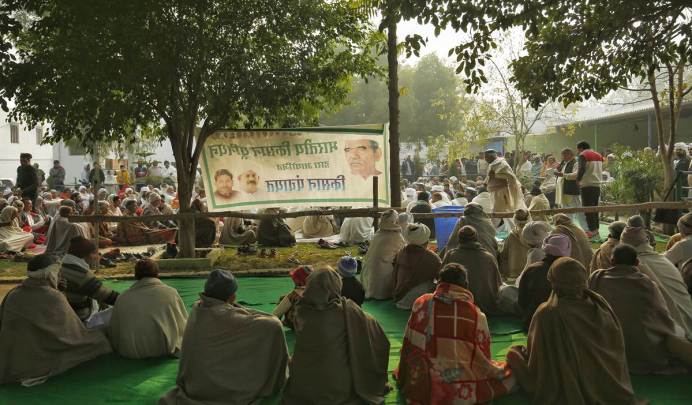 Kisan Panchayat meeting organised in Muzaffarnagar, Uttar Pradesh. (Express photo by Praveen Khanna)
Kisan Panchayat meeting organised in Muzaffarnagar, Uttar Pradesh. (Express photo by Praveen Khanna)
“Our district alone will send 1,000-1,200 tractor-trolleys, each carrying 25 people, for January 26,” claims Rajkumar Guddu, a BKU leader from Banat near Shamli. Saturday saw a dress rehearsal of sorts, with farmers taking out a rally of some 1,500 tractors (sans trolleys) to the Shamli Collectorate. Sanjeev Chaudhary, whose father heads the Desh Khap of Tomar Jats from 84 villages in Baghpat, expects 2,000-2,200 tractor-trolleys to go from his district.
Chand Singh Balyan, a 20-bigha (four-acre) farmer from Sisauli, participated in the BKU’s 1988 Boat Club protest and also a 25-day siege of the Meerut Commissionerate earlier that year. The 72-year-old believes the current agitation is even bigger “kyonki isme doosre rajyon ke kisan bhi hain aur yahan mudda ganna ya bijli tak seemit nahi hai (because it has farmers from other states and the issues aren’t limited to sugarcane or electricity tariffs)”.
Sugarcane, unlike wheat or paddy, isn’t sold in agricultural produce market committee (APMC) mandis. Moreover, the cane SAP has to be mandatorily paid by sugar mills, which is not so with minimum support prices (MSP) declared for other crops. Why then are West UP’s cane growers worried about the three farm laws that, it is feared, would lead to APMC mandis shutting down and the end of MSP-based government grain procurement in states such as Punjab and Haryana?
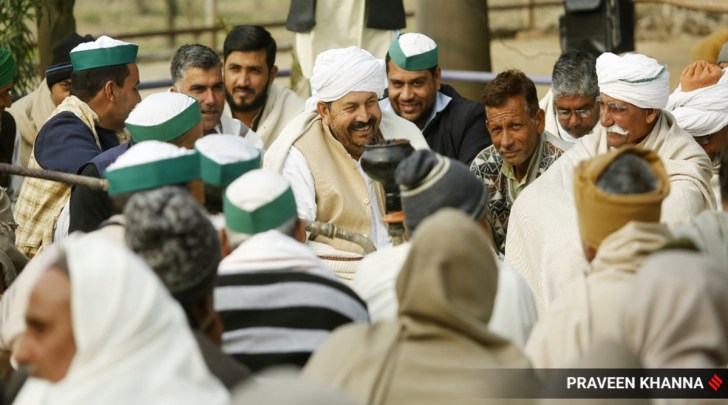 BKU chief Naresh Tikait at a meeting organised by the union at Sisauli village in Muzaffarnagar, Uttar Pradesh. (Express Photo by Praveen Khanna)
BKU chief Naresh Tikait at a meeting organised by the union at Sisauli village in Muzaffarnagar, Uttar Pradesh. (Express Photo by Praveen Khanna)
“If we don’t stand with our Punjab and Haryana brothers today, it could be sugarcane’s turn tomorrow. Besides, we ourselves are basically doing contract farming. The mills are legally required to pay us SAP within 14 days of cane delivery. But if the government is not enforcing this, how can contract farming be a solution for other crops,?” quips Amit Malik, who grows sugarcane on 8 out of his 12-bigha (2.4 acres) holding at Kharar village near Sisauli.
The 40-year-old supplied 470 quintals of cane to Bajaj Hindusthan’s factory at Budhana in 2019-20, against which he has got payment only for 300 quintals. He has delivered another 240 quintals in the 2020-21 season beginning October, for which no payment has come so far. This, even as the Yogi Adityanath-led BJP government in UP is yet to announce the SAP for the new season. UP mills currently owe cane farmers more than Rs 11,000 crore dues, including Rs 1,850 crore from the last season.
“Since this government took over (in March 2017), the SAP has been increased by just Rs 10/quintal. During the same period, it has doubled our monthly electricity charges for 10-horsepower irrigation pumps to Rs 2,000 and for 2-kilowatt domestic connections from Rs 400 to Rs 1,060. If you add diesel (Rs 62 to Rs 75/litre) and LPG cylinder (Rs 400 to Rs 700) rates, they have made agriculture a ghaate ka sauda (loss-making business),” adds Malik. Farmers have simultaneously experienced rising cost of pesticides (from Rs 1,400 to Rs 1,800 per 250-ml for ‘Coragen” insect control solution) and cane harvesting labour (Rs 25 to Rs 40/quintal).
It is all this bottled-up anger that’s now finding expression in the fight against the kaale kanoon. The fine print of the laws or its impact on particular crops and regions don’t seem to matter any longer.
Apr 16: Latest News
- 01
- 02
- 03
- 04
- 05




